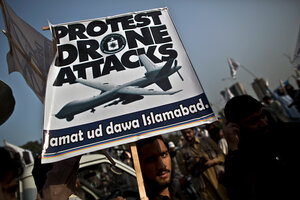Pakistan says US drone strikes won't stop Taliban talks
The US drone strike that killed Pakistan Taliban leader Hakimullah Mehsud infuriated Pakistanis and the government of Prime Minister Nawaz Sharif insisted peace talks with the group will go forward.

A supporter of the Pakistani religious party Jamaat-u-Dawa holds up a banner during a rally to condemn US drone attacks in Pakistan, in Islamabad, Pakistan, Friday, Nov. 1, 2013.
Muhammed Muheisen/AP
Karachi, Pakistan
Last week members of Pakistani Prime Minister Nawaz Sharif's government responded furiously to the US drone killing of the leader of the Pakistani Taliban, saying it had scuttled the chances for peace-talks with the group over ending a conflict that has claimed tens of thousands of lives in northwestern Pakistan in recent years.
But today, the government is indicating plans for peace talks are still moving forward despite the death of Tehrik-e-Taliban (TTP) head Hakimullah Mehsud and Prime Minister Nawaz Sharif said there was a political consensus in the country to make efforts for peace. Mr. Sharif said there was a need to bring “confused and misguided elements back to society.”
Criticism of the US has also been toned down. Mr. Sharif has often said that Pakistan can't risk isolating itself from the world. Sartaj Aziz, Sharif’s adviser on foreign affairs and national security, says “there is a long-term relationship [between the US and Pakistan]. Now this situation is arisen and we are trying to resolve it.”
The US ambassador to Pakistan was summoned to the Foreign Office on Saturday over Mehsud's killing. In a statement, the Foreign Ministry said his death would have a "negative impact" on efforts to negotiate with the TTP but that the government will continue to pursue them to bring an end to the ongoing violence.”
The US recently restored more than $1.6 billion in military and economic aid to Pakistan and Pakistan wants to expand energy sector and trade ties.
Domestic pressure
On Saturday Interior Minister Chaudhry Nisar Ali Khan said that the US had "ruined the road to peace." Today he said in a statement that his earlier comments had created tenser relations with the US.
Influential political leader Imran Khan and his Pakistan Tehreek-e-Insaf party want the Sharif government to close NATO supply routes to Afghanistan and in an interview with Dunya TV he said that this would cause the US a significant financial blow. The right-wing Jamaat-e-Islami, an ally of Khan’s party, has called Mehsud a martyr, a term largely reserved for soldiers killed in battle or assassinated politicians.
The government has promised to discuss options with politicians and says it doesn't believe closing supply routes would drone strikes. But so far the pleas of Khan and others have been ignored, and it seems unlikely that Pakistan’s powerful military favors major upheaval in the US relationship.
While the military is officially opposed to drone strikes – and is wary of American interests in the region – analyst Ejaz Haider, a Pakistani columnist, says the military probably opposes shutting down NATO supply lines through the country.
The last time Pakistan shut the supply routes was after 24 Pakistani oldiers were killed in NATO airstrikes in Nov. 2011. A furious Pakistan shut the supply of materials to the NATO war effort in Afghanistan for 7 months in response.
Pakistani anger at the death of its soldiers is understandable. But taking the same approach to the death of a man responsible for the killing of thousands of Pakistani soldiers and civilians, as well as an alleged attempted terrorist attack on New York City's Times Square, would not sit while with either the US or Pakistan's military.
“Notwithstanding the fact that drone strikes are illegal as far as international law is concerned and that the Pakistani government has not given consent to strikes over the past two years, you still have someone taken out who was responsible for killing thousands of Pakistanis, who planned attacks on civilians and armed forces,” Mr. Haider says.
Shamila Chaudhary, a senior fellow at the New America Foundation and a former US National Security Council director for Afghanistan and Pakistan, says under the right circumstances Pakistan can accept the US killing of Taliban leaders, but that the timing of this attack "is what really angered the Pakistani government."
She recalls the visit of Lt. Gen Ahmad Shuja Pasha, the former head of the Pakistani military's powerful Inter-Services Intelligence spy service, to Washington in April 2011. Gen. Pasha's visit was in the aftermath of Raymond Davis, a CIA contractor in Pakistan, killing two men in Lahore that January and Pasha was seeking to smooth relations with the US. Soon after he returned home though, two US drone strikes hit Pakistani tribal areas.
"This angered the Pakistanis then because it looked like General Pasha had either given approval for the strikes or that the United States was dismissive of Pakistani sensitivities," she says. The killing of Mehsud, at a time when the government was reaching out, is similar. "The miscalculation of timing reveals that there is still a lack of awareness and consideration on both sides of the domestic sensitivities associated with their 'cooperation.'"
While the Pakistani government has questioned the timing of the drone strike, the US had set its sights on Mehsud for a considerable period of time. Congressman Mike Rogers, who chairs the House of Representatives’ permanent select committee on intelligence, defended the drone strike that killed Mehsud on CBS’s Face the Nation Sunday.
The comments were widely broadcast on Pakistani television channels. “This was a bad guy. There's some information recently that concerned us about the safety of our troops,” Rep. Rogers said. “I feel a little better for our troops today than I did before this event happened.”
“We should protect our soldiers in the field and we should also protect their families who are here back in the United States,” he said. “And we should use every means that is legal, protects civil liberties and gets the job done."

